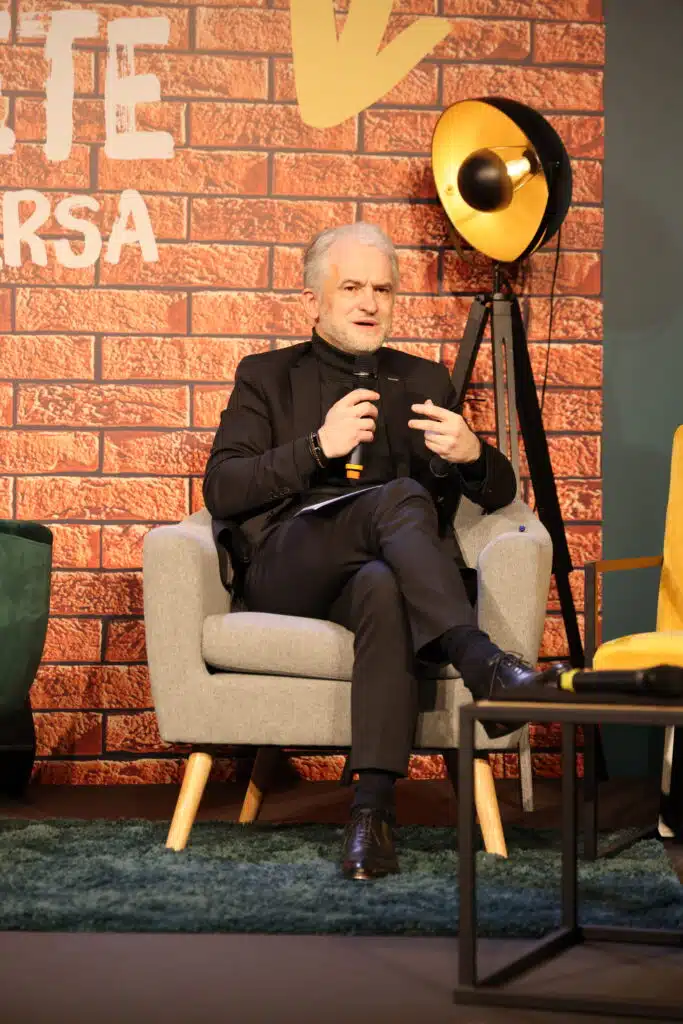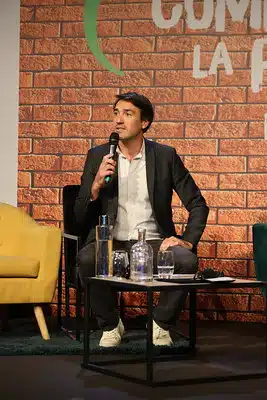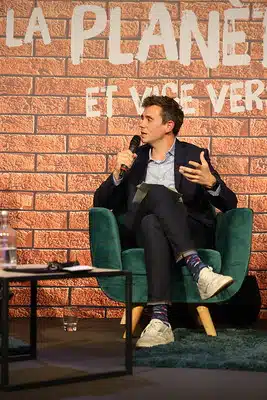For his very first time at the world forum for a responsible economy ,Rob Hopkins author and founder of the Transition Movement made it clear : the role of communities is crucial in the transition movement.The activist took part in the opening plenary session to give an inspiring speech full of caring, hope and faith for the future. He shared his vision of today’s world and gave his secret to staying optimistic.
In this your first time at the world forum for a responsible economy, What does it mean for you being here in Lille, a European metropolis engaged in this transition and innovating new method of development ?
Rob Hopkins: France is a country with a real interest in transition. Lille is one of those cities that embraced the idea of being a « laboratory» where new projects can be tried out and experimented. That is why I am enthusiastic to be here.
You give conferences and masterclasses in universities. You also participate IN TedTalks and you have worked with Cyril Dion on his documentary « Demain ». You are very committed to the idea of sensibilisation. However, don’t you think that an important part of your public is already aware of global warning and wants to be involved in the transition process?Therefore, how could we sensibilise the others, all the individuals that ignore the great impact they can have?
R.H: It is true that I am often invited by local transitional groups which are already involved in different projects, impacting different communities. But I don’t think that every single person attending my conferences is « sensibilised ».
I am very surprised by the increasing number of people coming to those events. People are showing a growing interest in the idea of transition. I think that the movie « Demain » also had a very positive impact on individuals that thought they did not have a role to play.
When it first came out, I went to the premiere in Paris and different streamings afterwards. I was really impressed by the diversity of the audience. Once, a group of young people in their early twenties came to me and explained that after the terrorist attack in the Bataclan, they had lost sense of their story. « Demain » gave them hope and showed them what life they could aspire to.
What message do you want to deliver to the people who want to be part of the transition? What concrete gestures can we do on a daily basis to have a positive impact on our communities ?
R.H: If we look at the student level, really active movements working on the transition exist. They organize concrete action with different actors from the community and provide us with tools to achieve the transition. If your dream is to work for a better future, you will find other people to work with you and achieve this commun dream. In my early twenties, I started to be really passionate about the transition and environmental issues. I did my permaculture degree and since then it’s been my life. It is not a path to great riches but it is really satisfying and I will never feel guilty when I look at my kids in the morning.
You gave us numerous examples of successful individual actions during your speech. And indeed, fantastic and promising projects are taking place all over the world. However, the last report of the IPCC is really pessimistic. Changes have to be done and we are running out of time. Individual actions do not seem enough, what kind of role should States play?
R.H: Transition is not only about individual actions. A line has to be drawn between them and the authorities. The role of the state is to ask to people: « what do you need, what do you want us to do, how can we help you ? ». The basic idea should come from you, the citizen, working with the district, the municipality. The Barcelona model is amazing. The population is really working with the municipalities to improve the public policies.
After the IPPC report, we know how important it is to use less energy, to consume less products and also to eat less meat. It is a reminder and those ideas are becoming increasingly popular. Today in the UK, young people are embracing the idea of eating less meat, whereas when I was young, vegans were a minority and often marginalized, seen as very depressive. Today the message is the same but the way it is formulated has changed. The State should help this kind of movements.
Nowadays, when we watch the news it seems that things are going in the wrong direction. What is your secret to staying optimistic about the future and to retaining this energy to embrace positive changes ?
R.H: First of all, it is really important not to watch the news as often as we do. Media tend to only show the negative aspects of what is going on in the world. When the IPPC report came out, Rebecca Solnit wrote a beautiful article explaining the importance of shifting our focus on all positive things that are happening in the world. It is moving fast, maybe not fast enough, but it still moving faster than ever. For sure, I have pessimistic days, especially when I read this report, but at the same time it says that there are still possibilities. Fantastic movements and projects exist.
Mathilde Bigot
Alix Makereel



